|
In
a world where labelling just about everything and everybody
seems to be the norm, it could be argued that there are
two categories of Jackie Chan fans, those who discovered
him through his earlier Hong Kong work, and those who know
him primarily for his Hollywood adventures. It's very
likely that a good many of the latter have retrospectively
discovered the delights of his pre-US movies, but I'd imagine
that there are considerably fewer fans of old school Chan
who hold the later works in equally high regard. In Hong Kong, Chan
became the reason for any film he appeared in to be made in the first place, but in Hollywood
no producer was prepared to risk all on a Chinese martial
arts star, no matter how famous or talented he is. The execs
knew only what they needed to know, that he had made his
name with comedic kung-fu and made an awful lot of money
doing it. But he's Chinese. And they're not ready yet for a Chinese lead to carry a film on his own. He was thus repeatedly cast
as the Asian action man alongside bankable western comedy
foils in stories of mismatched partners who learn from each
other and become best pals. Chan was allowed to choreograph
the action, but the Hollywood directors just didn't seem
to know how to film it. Rush Hour may have
made a fortune and have a great many fans (it is rather fun), but compare it
to Police Story or Armour of God
or Project A and it absolutely pales.
The
news that Chan was returning to Hong Kong to make his first
full blown action movie there for some years was thus met with
excitement by the fan
community, albeit tinged with a little apprehension. Freed from the safety restrictions imposed by the
Hollywood system, Chan could once again seem to risk his
neck doing the sort of insane stunts that had once been
his trademark. But despite the star's extraordinary athleticism,
sooner or later even he is going to have to acknowledge
that he's getting older, and when he made New Police
Story he was almost 50 years of age. However fit
you are, you really can't do at 50 what you were capable
of at 20.
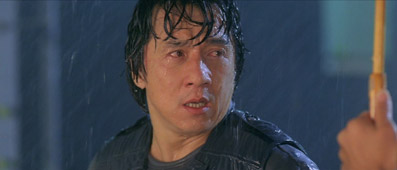
With
this in mind, electing to make further chapter in the Police
Story series for his Hong Kong return was a smart move.
Unlike some of his wilder comedy capers, these films have
always incorporated the action into a reasonably solid dramatic
base, balancing the combat and stuntwork with narrative and playing down
the comedy, which tended to be character based rather than
all-out slapstick. There are also specific expectations associated
with the series – familiar dramatic arcs (Chan's cop will
be defeated or humiliated in some way and return to form in order to
shine by the end), furiously choreographed and performed fight
sequences, and at least one spectacular action scene involving
motorised vehicles (buses are particularly popular). If that
makes it sound as if the films are made to a formula then
you've read it right. They are. But with Chan it really is
all in the execution.
New
Police Story [San ging chaat goo si] opens in unexpected fashion, with Chan's super-cop (who
is also named Chan) stumbling around in an alcoholic stupor
before collapsing in the gutter and being robbed by two
punks. It turns out that this is actually not the start at all, but
a flash-forward taste of things to come. The story proper kicks off
in breezier fashion, with Chan freeing two hostages from
a pissed-off, grenade-waving investor (he's just lost all
his money and wants revenge on his financial advisor) and
giving a pep talk to his younger colleagues. But trouble
is not far away, perched on a ledge far above the Hong Kong
streets in the shape of four nihilistic rich kids known
as the X-Crusaders, who rob banks for the buzz and encourage
their victims to call in the cops solely for the fun of
shooting them up when they arrive. Chan is assigned to the
case and boldly claims that he can nail the gang in
just three hours. He appears to making good on this, quickly
locating their hideout and leading a force in to apprehend
its inhabitants. But it's all a set-up, an elaborate trap
that leaves everyone but the despairing and humiliated Chan dead.
Ah, so that's why he hit the bottle...
In
narrative terms, none of this will be particularly surprising
to series fans, but director Benny Chan (no relation) doesn't
let that bother him, borrowing a CGI trick from Fight
Club to introduce his bad guys (and girl) and staging
the fatal ambush as a nerve-wracking cross between an
elaborate police assault course and the multi-trap maze
of Cube. This sequence climaxes in a scene
of extended psychological torture, as Chan's injured colleagues
are dangled above his head and plunged individually to their
deaths when he fails to complete set tasks at the required
speed. His humiliation is completed when the gang then upload
the ambush onto the net as an on-line game.
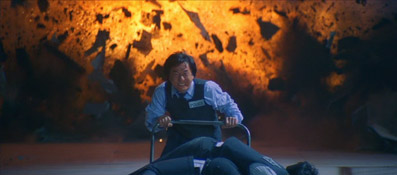
Chan's
slow crawl out of his alcoholic haze is initiated and aided
by the impossibly cheerful young Cheung Sui Fung (Nicholas
Tse), a fresh-faced officer assigned by the Chief to work
with the detective and catch the gang responsible. Chan
is initially hostile to Cheung, but when the young cop hooks
up with pretty young technical support officer Sasa (Charlene
Choi), the trio become determined to bring the X-Crusaders
to justice.
Although
plot is usually little more than a direct route from one
action sequence to the next in Hong Kong action cinema,
there's actually more meat to the narrative here than I
have chosen to reveal, including a couple of twists
that should definitely not be spoiled in advance. Of course,
there are a fair few plausibility issues to deal with, from
police station security (just who is in charge of checking
who comes in and out?) to the best shot in the force missing
with every bullet when the plot requires, while the X-Crusaders
are as cartoonishly immoral a group of villains as you'll find in the
wildest martial arts movie. But it all plays out in consistently
enjoyable and energetic fashion. There are even some intriguing
and unexpected subtextual undercurrents in the shape of
the loud, flashily dressed, BMX-riding youth gang, who award
themselves points for kills, videotape their gunfights with
the police and hurl themselves down the sides of skyscrapers to
effect an illegal entry, reflecting the older generation's
dismay at what it sees as a valueless youth culture obsessively
in search of the next high, so hooked in to the technological
age they are unable to disconnect reality from the wired
world. This is balanced a little by a flashback that suggests
that the seeds for this are sewn not by the hardware trappings
of a modern society, but by family and parental attitudes,
something of a favourite for demented movie killers.
Chan
may be taking a few less risks as he reaches middle age
(the extent of the wire work involved in many of the stunts
is revealed in the extra features), but he and his fellow
cast members are still willing to go where actors would
normally send their stunt doubles. Chan leaps, dives,
fights and gets hit in a manner that would leave many younger
men in traction, but it's probably Nicholas Tse who gets
the roughest ride of all, hurtled head first and backwards
down the side of a skyscraper, and tied up and dangled off
a steeply sloping metal roof, both locations potentially
fatal distances from the hard ground below.
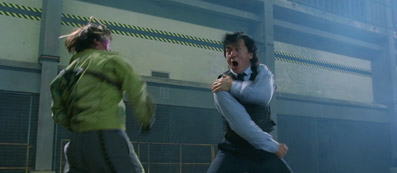
If the mad stunts have been reigned in a little, then the
increased weight given to the dramatic elements put greater
demands on Chan the actor, something mainstream reviewers
have not been all that kind about. While I'll concede
that the histrionics of despair are played a little to the
gallery, I would also point out that this is normal
for Hong Kong cinema and that in the quieter moments (the
scene in which Cheung re-unites him with his wife is a good
example) Chan delivers the goods with impressive restraint.
There is no exaggerated mugging here, with the film's few all-out
comic moments confined largely to a break-out in which
an entire police station seems complicit, a genuinely
funny scene whose best-timed gag caught me with a wine glass
at my mouth, the contents of which the resulting guffaw sent
spraying into the air.
Where
the film shines the brightest is in its technical
handling – the direction, cinematography and sound mix are
all first rate – in the excellent location work and, as you'd
hope, in the action set-pieces. Wire work or not, they deliver
in spades, the most outrageous of which sees two gang members
launch themselves down the side of a very tall
building on rollerblades and a BMX bike, followed by Chan
and Cheung, improvising wire brakes with handcuffs and a
metal pole (and let's not forget the poor camera operator
who's hurtling down with them), although for the sheer scale
of the destruction, the out-of-control bus that tears through
a shopping street with Chan balanced on its roof takes some
beating. The fighting, when it comes, is blisteringly choreographed
and performed.
All
things considered, New Police Story is
something of a delight. I realise I am speaking as a member
of the old-school Chan fan base and that even we know that
a fourth sequel is always going to fall some way short of
such an esteemed original. But for my money this is Chan's
most enjoyable, most substantial and most exciting film
in several years. Really.
Framed
2.35:1 and anamorphically enhanced, the transfer here is
nothing short of gorgeous. Detail is excellent, contrast
and black levels as close to perfect as you'd want and colour
reproduction is bang on, with natural skin tones and rich,
vibrant primes. I've got no complaints at all here.
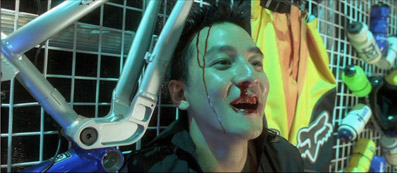
Three
soundtracks are included – Cantonese Dolby 5.1, Cantonese DTS
and an English Dolby 5.1 dub, voiced by what sounds like many
of the real cast (most of the X-Crusader actors, though
of Chinese parentage, actually reside in the USA). The Dolby 5.1
tracks are good, but the DTS is superb, having considerably
more volume and oomph and a sometimes ear-bending use of
surrounds – the street gun battles are a blizzard of gunshots,
impacts and ricochets that place you right in the middle
of the action. LFE bass is also impressive, with explosions
in particularly good at shaking the cutlery and frightening
the neighbours.
A
2-disc release, the only extra on disc 1 is a trailer
gallery for other related HKL releases. The
disc 2 extras are divided into three categories.
Promotional
Gallery
Original
Theatrical Trailer 1 (0:57) hints at what
you're going to get and is likely a pre-release teaser.
Original Theatrical Trailer 2
(2:26) and Original Theatrical Trailer 3
(2:06) are a lot meatier and really give a flavour of the
film. The UK Theatrical Trailer
(1:24) does OK.
Interview
Gallery
Benny
Chan (19:21)
The director discusses his career, working with Chan (who
apparently would be on set even on his days off) and the
other actors, location shooting and a lot more. He expresses
regret that he did not get the balance between characters,
drama and stunt work right, and usefully explains that some
of the plot holes are the result of having to chop an hour
from his original cut of the film. The interview is intercut
or screen-split with making-of footage, which sometimes
spirals in to draw attention to itself, but it's a considerable
improvement on the tiresome dual view of the same interviewee approach we've been
subjected to on some recent HKL releases.
Star
Attraction: UK Exclusive Cast Interviews (19:33)
Key members of the support cast are interviewed in English,
which is not a problem given that most of tem seem to reside
in the USA and actually have broad American accents. Most
seem to have been awed at the chance to work with their
idol, but they also have good things to say about their
director.
The
Making of New Police Story (15:35)
What looks like a Hong Kong EPK, with behind-the-scenes footage
cut with interview snippets in which the actors tell us
about their characters and the director talks about the
film in general, all set to constant music and presented
with zippy graphics. This does reveal the extent of the
film's wire work, which might ruin the illusion for
more devoted fans.
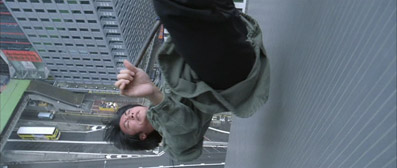
Behind
the Scenes
18
behind-the-scenes videos (57:21
total) presented without commentary or interview. They range
in length from just 39 seconds to a far more substantial
10 minutes and are of variable interest, the key sequences
being the coverage of the bus crash, the skyscraper drop
and the Conference Centre roof shoot. A couple of nice out-takes
are included, and there's an amusing moment when Jackie
is throwing balls at the camera then turns to walk off and
bangs his head on the set. The sound drops very low on some
shots, but does recover.
If
you're not a fan of Jackie Chan's style of action cinema
then all of this will fall on deaf ears, and that's fair enough. If
you are, and especially if you long for the old school Chan
of his pre-Hollywood era then you can put your happy shoes
on, as New Police Story plays like the
trip to America never even happened.
The
extra features here are pretty good, but if you're buying
this disc it should be for the main feature, which is impressively
presented. Hong Kong Legends have done a splendid job on
the transfer, and those of you with DTS sound will have
particular reasons to be pleased with this release.
|